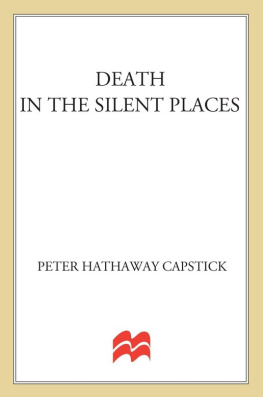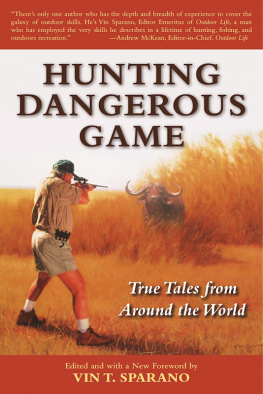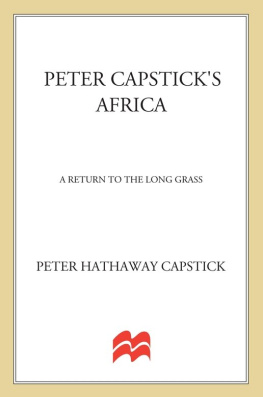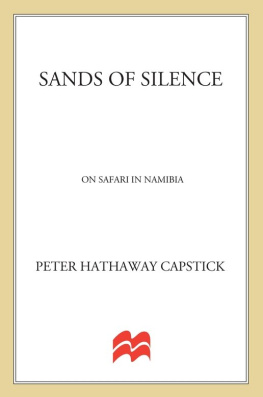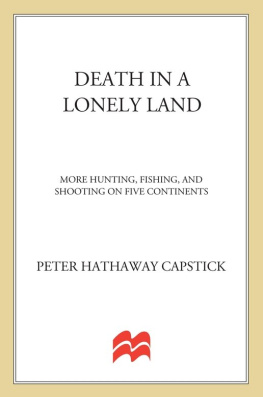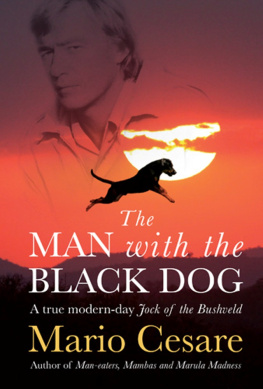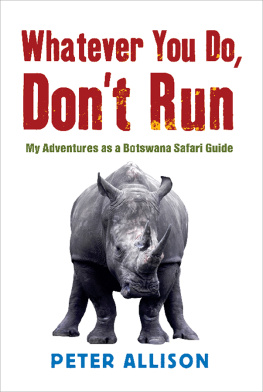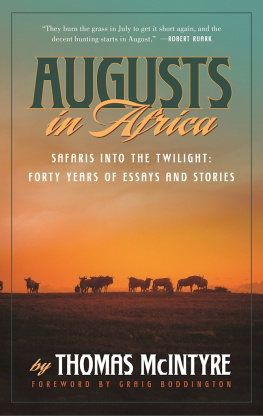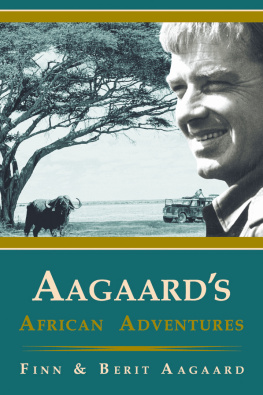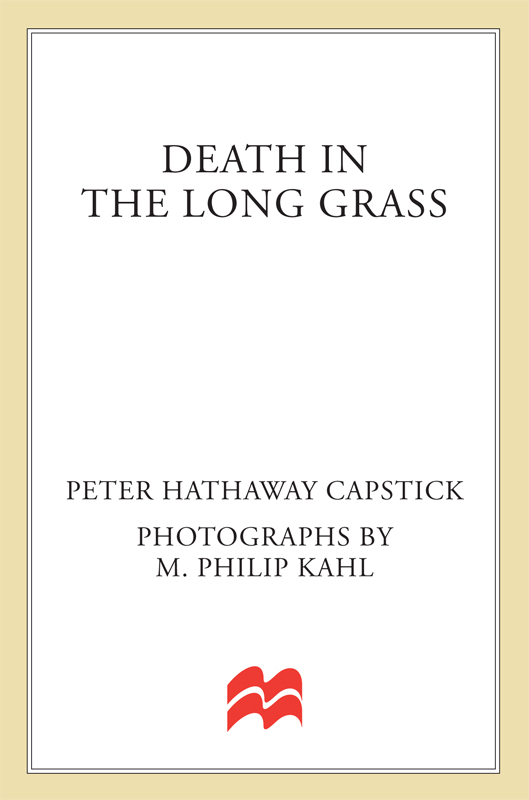
The author and publisher have provided this e-book to you for your personal use only. You may not make this e-book publicly available in any way. Copyright infringement is against the law. If you believe the copy of this e-book you are reading infringes on the authors copyright, please notify the publisher at: us.macmillanusa.com/piracy.
Contents
Acknowledgements
The author wishes to express his thanks and appreciation and admiration to the following persons who, in an astonishingly wide variety of ways, contributed to the production of this manuscript:
Col. Charles Askins, unquestionably one of the worlds greatest living hunters and firearms experts for his encouragement and companionship.
John W. Cox for kind permission to quote his reminiscences of a hairy night in Central Africa.
Tom Siatos, Howard French and Ken Elliott of Petersen Publishing Company for their aid, encouragement and generosity in permitting me to include material from GUNS & AMMO and Petersens HUNTING Magazines.
Malcolm C. A. Lyell and Carey Keates of Holland & Holland Limited for their help in the matter of record elephant tusks.
Robert P. Mills, my agent, for his efforts and guidance.
Les Pockell, my editor, who proved that 10 pounds of potatoes can fit in a 5-pound bag without mashing them first.
Alan Root, the intrepid wildlife photographer of Kenya, for kind permission to quote his episode with a killer hippo.
M. Philip Kahl, Ph.D., one of the finest wildlife photographers in the world, for making available some of his best work for this book.
Silent, Invisible, Debalo and Amos, my African family, who did yeoman duty keeping my tail from those snapping jaws.
Lastly, yet foremostly, my wife, Mary Catharine, to whom I can never repay the months of loneliness when I was in the bush or the hours of creeping uncertainty spent locked away from terrorists with only a pair of automatic shotguns for company.
To the memory of my good friend Dean Witter, Jr., who had to leave early.
I speak of Africa and golden joys; the joy of wandering through lonely lands; the joy of hunting the mighty and terrible lords of the wilderness, the cunning, the wary and the grim.
Theodore Roosevelt
Khartoum, March 15, 1910
Foreword
I have often been asked how a Wall Street stockbroker and investment banker goes about swapping his chalk-stripe for camouflage, a change in life styles no less than polar. I suspect that the answer to that one is rooted in my early years, although it did not blossom into a decision until I was nearly thirty years old. Me and Gauguin.
Born in that part of New Jersey that strangers, used only to the ferro-concrete squalor of the New Jersey Turnpike, find hard to believe exists, my childhood I spent in the deep mountainous woods and waters around Lake Valhalla, Montville, in Morris County, where my father was an owner/developer of a club community. My infancy was centered in nearby Boonton, where my grandmother played Elizabeth Regina in a huge gargoyle of a Victorian house that today would give Vincent Price the crawlies.
From the start, the family suspected there was something a bit spooky about young Peter. From about age six, my whole world was centered on stalking and actually catching live songbirds with my bare hands on the lawn. They were healthy, adult robins, grackles, and the like, and I suspect the neighbors took to crossing themselves and wearing garlic as they watched me ease up with the stealth of a cat and grab them, then run off to show poor mother my latest prey, which I then released. I believe my high score was five in one afternoon.
When we moved to the lake in 1944, I found I had several thousand acres all to myself and, with only three playmatesone younger and one a girlI lived the life of a young Abominable Snowman, hunting, fishing, frogging, and generally sweeping the countryside like a Zulu impi on a rampage. Nights were spent with pet opossums and raccoons devouring David Corey, Selous, Roosevelt, Baldwin, Harris, Baker, Stanley and the works of anybody else I could borrow or ransom that had anything to do with my new fascination: Africa. By the time I was twelve, I had a vocabulary of a couple of hundred KiSwahili words (a hell of a lot of good that did me).
Through prep school at Morristown and college at the University of Virginia, I spent every spare moment either hunting and fishing or dreaming about it. Vacations were spent bass fishing with my brother Tom or prowling the grouse and woodcock covers. After college, a monument of mediocrity, and a short stint in the army, I bit the bullet and went into the securities brokerage business, learning the ropes as an order clerk and finally passing my examinations for customers man. To the intense surprise of anybody who knew me, I did pretty well financially, well enough to decide after five years of my life sentence that there just had to be something else in life besides commuter trains, slush, strikes, and muggings. Perhaps I had been overexposed to Thoreaus quiet desperation, I couldnt say. I simply decided that I wanted to be a professional white hunter and, as I wasnt getting much younger very fast, determined to give it a go.
Perhaps a word of semantical direction is in order. The term white hunter is, with all due apologies to the Tanzanian government, not a racist title. It merely designates a non-African who conducts safaris for sport in Africa. The job is also called professional hunter, PWH, or PH, and has nothing to do with the use of the word guide as applied in North America. In Africa a guide is one licensed to drive tourists on photographic safaris only and has no bearing on hunting. More and more I hear myself referred to as a Great White Hunter. I have no idea where the term comes from, though I suspect it is probably an Americanism. So, to set the matter straight, there are Great White Whales, Great White Hopes, even Great White Ways. There are no Great White Hunters. Mediocre, at best.
To simplify the story I found myself in Central and South America as an apprentice jaguar hunter learning one side of the safari trade. A year later I started a travel agency for sportsmen, booking hunting and fishing trips worldwide. As president I was able to travel considerably, which widened my knowledge and experience quite a bit. I finally sold this firm and became hunting and fishing director of Winchester Adventures, Inc., a subsidiary of the famous arms manufacturers. After two years of traveling for them as a professional client, checking out the facilities of safari firms all over Africa and most of the world, I decided to go for broke. I resigned and joined the old Luangwa Safaris, Ltd., out of Chipata, Zambia, and soon gained my full professional hunters license. From Zambia I also became licensed in Botswana and Rhodesia as well as spending some time in Ethiopia, usually hunting six months per year and returning to the United States to write for magazines the other six. My wife, Mary Catharine, whom I met in 1970, was with me in Africa until 1975, when we finally left Rhodesia after political difficulties made booking clients too difficult.
Thats the how; the why may not be so simple. In these days of mouth-foaming Disneyism, with ten or more hours a week of thinly veiled, antihunting, network wildlife shows drumming into every twelve-year-old mind that man is slaughtering everything in sight in the name of horrid bloodsport, it is fashionable to look upon hunters, especially professionals, as depraved, moronic, insensitive buffoons. That the sport hunter is more responsible for wildlife conservation, through habitat preservation and species management (financed through donations, whopping fees, licenses, and stiff excise taxes on his equipment), than any preservationist group is not widely understood. If you doubt this, remember that the government brought out a special stamp a few years ago for $5, the proceeds of the sale going directly into wildlife and environmental conservation. The general public, who hoot and sneer at the hunter, didnt buy enough to fill three S & H stamp books, a tiny fraction of the monies generated by the sportsmen who pay the bird watchers way. Of course, you cant blame the networks; theyre selling dog and cat food and have learned to give the people who believe in such shows what they want.


